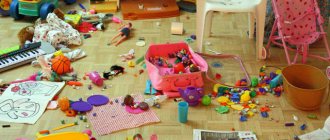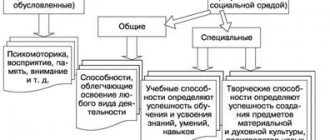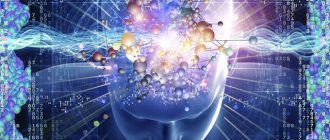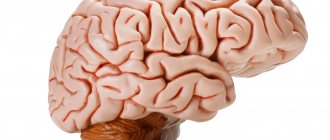Definition
Cognitive abilities are a set of brain processes involved in understanding the world around us. With the help of them we perceive, process, sort, remember, store and reproduce information.
Cognitive abilities include:
- perception,
- attention,
- memory,
- thinking,
- speech,
- imagination.
These are those mental processes that help to effectively interact with information coming from the senses. All of them are closely interconnected and complement each other. If some process is lame, then others partially take over its function. This embodies the principle of flexibility and compensatory psyche.
When we characterize a person as “smart,” we are placing a high value on his cognitive abilities.
Heredity and congenital characteristics affect the quality of cognitive functions. But to a much lesser extent than was previously believed. A person’s purposeful work on their development plays a primary role.
This means that a person who has average innate abilities, but regularly trains his cognitive functions, will soon overtake someone who is naturally gifted, but does not develop his inclinations.
What are cognitive abilities?
Let's take a closer look at all human cognitive abilities and figure out how to develop them.
Perception
Perception is a set of mental processes that are responsible for reflecting in the mind images of objects that directly affect the senses.
Perception should not be confused with sensations, because this is a more complex process. Unlike sensations, which reflect individual properties of objects (cold, bitter, light), perception forms a holistic image.
Perception is for the most part a reflex process, which means it occurs without the participation of consciousness. Therefore, it is considered to be the simplest cognitive function. But this in no way diminishes its importance. It is perception that provides “food” for more complex cognitive functions. Defects of perception leave a serious imprint on the functioning of the entire psyche and the capacity of a person.
There are several conditions on which the level of development of perception depends:
- Active movement. To form spatial perception, motor activity is necessary.
- Feedback. To correct errors in a timely manner, a person must have the opportunity to compare the image of a perceived object with the object itself.
- Sufficient amount of incentives coming from outside. Sensory hunger leads to perception disturbances.
- Variety of incentives.
In adulthood, perception can be developed through training of the senses. Exercises are used both to train each analyzer individually and for all of them in a complex.
Attention
Attention is a mental function responsible for the selectivity of information perception. Attention allows you to isolate significant ones from billions of internal and external stimuli and concentrate on them.
The better developed attention is, the longer a person is able to hold some object in consciousness without being distracted by extraneous stimuli.
Attention can be compared to the light of a flashlight in the evening twilight. We see objects on which light falls clearly and clearly. While everything around has only vague outlines.
The importance of this cognitive ability cannot be overstated. It is the basis for the effective operation of all other functions. We will not be able to remember and reproduce information if it is not in the focus of our attention. Accordingly, we will not be able to perform any logical operations with it.
There are two types of attention:
- Involuntary attention is activated without the participation of the will. For example, in response to a strong stimulus: a loud sound, a bright flash of light. We reflexively direct attention to an object that we assess as dangerous. Also, attention itself flows towards potential pleasure. We don't need to specifically focus on what feels good. It happens naturally.
- Voluntary attention is a conscious process. A person activates it through willpower. When we talk about training attention, we mean voluntary attention. The longer you can consciously focus on an object or action, the higher the quality of your attention.
To train attention, Schulte tables, wedge-shaped tables, and various pictures are used in which you need to look for hidden objects or differences.
All these exercises are in our article on how to develop attention. Be sure to check it out.
Memory
Memory is a set of mental processes for consolidating, storing and reproducing received information.
Memory plays a huge role in cognition and transformation of the world. It is thanks to it that a person can learn, gain new knowledge and develop new skills.
What is the psychophysiological mechanism of memory? In the process of interaction with information, foci of excitation arise in certain areas of the brain. Neurons (brain cells) exchange electrical impulses and form synaptic connections with each other. The electrical signal is transmitted from neuron to neuron, and its entire path is imprinted in the brain in the form of neural circuits. Subsequently, the brain is able to reproduce this path under certain conditions.
There are 86 billion neurons in the human brain. Each of them is capable of forming up to 10 thousand synapses with other neurons. The capacity of each neuron is 4.7 bits. This means that the memory capacity as a whole is approaching a thousand terabytes.
There are several main classifications of memory.
According to the nature of mental activity, memory is divided into:
- motor,
- figurative,
- verbal-logical,
- emotional.
According to the duration of consolidation of information, memory is divided into:
- operational,
- short-term
- long-term
According to the nature of the goals of the activity, memory is divided into:
- free
- involuntary.
There are a huge number of memory training methods. You can get acquainted with some of them in our article on how to improve your memory. I also recommend reading about how to remember information.
Thinking
Thinking is the highest level of human knowledge. At this level, connections between objects are formed, their classification, systematization, and properties are identified. With the help of thinking, a person gains knowledge that cannot be obtained with the help of the senses.
Thinking is a complex mental process. It takes years to form. There are several stages of thinking development:
- Visual and effective thinking is typical for children under 3 years of age. It works directly during interaction with objects: the child learns to assemble a pyramid, sort toys by shape, etc.
- Visual-figurative thinking predominates between the ages of 3 and 7 years. During this period, the child is able to operate with images of objects to solve problems without direct contact with the objects themselves. For example, imagine what the person depicted in the picture will do.
- Verbal-logical (abstract) thinking is the highest level of development of thinking. It functions on the basis of language and is responsible for the use of abstract concepts and logical constructs, that is, that for which there is no material expression.
It is noteworthy that the process of development of thinking in each individual person repeats the process of evolution of thinking in humanity as a whole. Among primitive people, visual-effective thinking first arose, then it evolved into visual-figurative thinking, and only then took shape into abstract thinking.
Thinking requires constant development from a person. If this does not happen, then it begins to degrade. To train your thinking, you can use logical and mathematical problems, crosswords, special exercises and simulators. All this is in our article on how to develop thinking.
Speech
Speech is a complex mental process unique to humans. In addition to communication, it performs a number of other functions, including cognitive ones.
A person’s idea of the world is formed in the process of mastering his native language. With the help of speech, a person is able to obtain knowledge about objects and phenomena without having direct contact with them. This significantly expands the boundaries of knowledge and gives us truly unique opportunities.
Speech is closely related to all other cognitive functions. It affects even such basic cognitive abilities as perception. For example, scientists have found that people are unable to distinguish colors for which they do not have a definition in their language.
You need to develop your speech in several directions at once: replenish your vocabulary, work on diction and articulation, improve the expression of thoughts in oral and written form.
Imagination
Imagination is the ability of consciousness to generate new images, ideas, ideas based on previously acquired knowledge.
Imagination plays a key role in processes such as modeling, planning, and creativity. The world we live in now is the result of the imagination of our ancestors.
The specificity of imagination as a cognitive function lies in the processing and comprehension of previously acquired experience. In this regard, imagination is similar to thinking. The result of both processes is advanced reflection. But the only difference is that thinking operates with concepts and categories, while imagination operates with images.
Psychologists identify 5 main techniques of imagination:
- Agglutination. Or, in simple words, gluing. A new image is created by connecting two or more existing objects. For example, a centaur is the result of agglutination of a man and a horse.
- Hyperbole, litotes. The first means exaggeration, the second means reduction. An example of hyperbole is a giant. An example of litotes is Thumb Boy.
- Accentuation. This technique is used to highlight a specific characteristic. For example, Buratino has a long nose.
- O impersonation. The essence of the technique is to endow inanimate objects with the characteristics of living beings. Almost no fairy tale can do without this technique.
- Typing. Endowing an image with characteristics typical of a whole group of similar objects or phenomena.
We can use these techniques to train our imagination.
You can find several techniques for developing your imagination in our article, in which we have collected exercises for developing creative thinking.
Cognitive sphere of personality
Scientists from all over the world have at different times asked questions about the nature of intelligence. One of the most important questions is: what kind of person can be called smart? The answer has still not been found. But if we are closer to it, then it lies in the cognitive sphere of the individual.
The cognitive sphere of personality is a cognitive sphere that includes such cognitive processes as:
- Mnemonic processes: memory. In particular – preservation, memorization, forgetting, reproduction. Their main function is to store information in memory.
- Perceptual processes: perception, sensations, attention. Their main function is to receive information from the internal and external environment.
- Intellectual processes: imagination, thinking, speech. Their main function is to generate information, fill gaps in information and exchange it.
Many cognitive psychologists believe that the most important cognitive processes are memory, imagination, and attention.
Memory . Plays a key role in the cognitive sphere of the individual, one might say decisive. It is a fundamental component of intelligence and its functions are much broader than simply “remember as much as possible.”
There are several types of memory. Here are some of them (according to content criteria):
- Emotional memory is a memory for an emotional state that arises in all situations without exception. To some extent, it complements all other types of memory.
- Motor memory is memory for movements. If a person has developed motor memory, he has dexterity in work, physical dexterity, and masters activities that require coordination of movements.
- Verbal-logical memory is memory for thoughts that are formed using words.
- Figurative memory – memory for auditory, figurative, olfactory, gustatory and other images. Well developed among artists, architects, writers and scientists.
According to the criterion of time, there are short-term, long-term, working and intermediate memory.
It should be said that all types of memory cannot be considered separately; they are interconnected to one degree or another.
Imagination . A person can imagine something that does not exist, and also plan based on a chain of interconnected thoughts. This is possible thanks to imagination.
Imagination helps a person to imagine the final result of his work and, no less important, its intermediate results. In this regard, it is worth noting that, despite the fact that imagination is considered a tool of representatives of imaginative professions, in fact this skill is vital for every person.
The functions of imagination are:
- management of physiological states;
- creation and implementation of an internal action plan;
- voluntary regulation of cognitive processes;
- management of emotional and need states;
- activation of visual-figurative thinking.
By type, imagination can be active or passive. During an active period, a person imagines the transformation of the world around him and plans to achieve his goal. By passive we mean dreams and dreams that do not come true.
Attention . This is a certain orientation of the mind that allows you to select something specific from a huge number of stimuli. Sensors allow a person to absorb stimuli from the environment and thereby consciously decide what to pay attention to.
Attention can be voluntary (when we consciously direct it using volitional effort) and involuntary (it occurs without volitional effort and is controlled by random factors).
Basic properties of attention:
- Focus (concentration) is the extent to which you can focus on some objects and ignore others.
- Resilience is how long you can focus on certain objects.
- Distribution is the extent to which you are able to hold several heterogeneous objects in your mind.
- Volume is the number of objects to which you can direct your attention with equal clarity and distinctness.
- Switchability is how quickly you can switch your attention from one object to another.
It should be said that in one area or another, cognitive abilities are also developed in animals. The more developed the organism, the more developed their cognitive sphere.
For example, earthworms are primitive organisms because they only have sensations. Whereas the frogs that eat them have developed perception. And herons that eat frogs have not only perception, but also thinking and memory. If we talk about the smartest birds, crows are considered to be the smartest birds. But among the animals there are primates.
In the human world the situation is somewhat different. The cognitive sphere of personality is formed in everyone, but specific people develop abilities in different ways. Hence the difficulties in answering the question about intelligence and the role of the development of cognitive processes in achieving success in life.
But there are obvious conclusions. If a person has a developed cognitive sphere, he:
- It perceives incoming information better, so it is better oriented in what is happening.
- Processes incoming information better and faster: throws out the unimportant and accepts the important. This allows him to work with the right material.
- He remembers information better: this means that he quickly extracts the necessary arguments and operates with them, and is able to retain complex diagrams and concepts in his head.
- Draws correct conclusions: If he knows how to sift the wheat from the chaff, remember complex concepts and has a good memory, then there is a possibility that he will draw the right conclusion and make an intelligent decision.
It should also be said that cognition is not a passive process. In order to perceive and process information, you need to pay conscious attention to it and make an intellectual effort.
Diagnostics of the cognitive sphere
There are (including on the Internet) many tests that, to one degree or another, promise to show the level of development of a person’s cognitive sphere. Here are some famous ones.
Diagnosis of attention:
- Munstenberg technique;
- “Proofreading test” technique;
- Landolt rings.
Memory diagnostics:
- A test to memorize ten words (ten words selected in such a way that no connection could be established between them).
- Wechsler subtest.
- Associative memory test (ten pairs of homogeneous words are read out, between which semantic connections are easily established. Then the first word of each pair is read out, and the subject names the second word).
Diagnostics of imagination:
- Toulouse-Pieron test.
- Torrance test.
- Test “Artist – Thinker”.
Using these tests, you can get a rough impression of each aspect of the cognitive domain.
Cognitive sphere of personality in a child
The first person to question cognitive development was Jean Piaget. He wrote a lot about the fact that a person must develop imagination, logic, perception, memory and other cognitive processes.
According to Piaget, a prerequisite for the emergence of speech in a child is the development of sensorimotor intelligence. His theory was constructivist, that is, it argued that a person can develop cognitive abilities through conscious actions in the environment. At the same time, Piaget insisted that children do not think like adults.
This is especially important for preschoolers. At this age, the intellectual foundation is laid. At the same time, mastering figurative forms of cognition will help the child understand the objective laws of logic and master complex concepts.
Research in the field of the cognitive sphere of a child’s personality was once carried out by S. L. Rubinshtein, L. S. Vygotsky, A. A. Leontyev, A. M. Shakhnarovich, F. A. Sokhin. If we summarize their views, we can deduce the following points:
- Speech and language are a kind of “knot” into which various lines of mental development are woven: imagination, memory, thinking, emotions and more.
- The child’s speech develops in the course of generalization of linguistic phenomena, his own speech activity and the perception of adult speech.
- The main task in teaching a language is the formation of linguistic generalizations and elementary awareness of the phenomena of language and speech.
- It is necessary to develop three functions of speech in a child: communicative, cognitive and regulatory.
Children, like adults, can also have their abilities assessed. With the help of tests, the reasons for school failure and the success of intellectual development are determined, for example. A conclusion can also be made about the need for correction of mental development.
Did you like the article? Join our communities on social networks or our Telegram channel and don’t miss the release of new useful materials: TelegramVKontakteFacebook
We also recommend reading:
- Storytelling
- Cognitive psychology and cognitive psychotherapy
- Two important laws of memory
- Exercises for memory development in preschoolers
- Spheres of personality
- Cognitive processes
- Intelligence and its development: several recommendations
- Cognitive load theory
- Types of memory and their features
- Visuospatial Corsi test: description and application
- Mental processes: types and brief description
Key words:_D1025, 1Cognitive sciences, 4Cognitive sciences
General recommendations for developing cognitive abilities
We looked at each cognitive function separately. Now let's talk about universal ways to develop them.
Before you begin to actively engage in mental training, I advise you to take tests to assess cognitive abilities. This way you can track your progress.
Proper nutrition
All cognitive functions, despite their non-material nature, are based on organic processes. The brain requires all the necessary nutrients to function smoothly. Their lack can lead to failures, decreased performance, and an increase in the number of errors.
Make sure your diet is balanced and rich in vitamins and minerals. Watch the ratio of proteins, fats and carbohydrates. Do not abuse fatty, sweet, starchy foods.
Add foods to your diet that have a beneficial effect on mental activity:
- red fish and seafood;
- walnuts, seeds;
- greens: dill, parsley, lettuce, spinach;
- bitter chocolate;
- eggs.
Full healthy sleep
The brain suffers from lack of sleep more than other organs and systems. The quality of all its functions is deteriorating. Therefore, you should not neglect this vital activity.
It turns out that you also need to know how to sleep correctly. Here are some tips to help you improve your sleep patterns and quality:
- Sleep 7–9 hours a night.
- Go to bed no later than 22.00.
- 2 hours before bedtime, eliminate physical activity, rich food, TV and computer games.
- Organize your sleeping space correctly. The room should be well ventilated, neatly cleaned, without unnecessary distracting stimuli.
Getting rid of bad habits
Alcohol, tobacco, and various psychotropic substances negatively affect the entire body, but the brain suffers first. Precious neurons that support all cognitive functions die from exposure to these substances. The sooner you can give them up, the better your chances of maintaining mental clarity.
You can find recommendations for getting rid of bad habits on our blog.
Reduced stress levels
The entire cognitive sphere of the individual suffers from psycho-emotional stress. This is due to the fact that during stress, a dominant is formed in the brain, which extinguishes other sources of excitation. A stressful situation takes over all your attention.
At the biochemical level, stress is characterized by the release of hormones responsible for mobilizing the body to combat danger. This is a very energy-consuming state that quickly depletes all reserves.
You must take good care of your mental hygiene and strive to avoid extreme stress if you want to maintain a high level of cognitive activity. Regular meditation, yoga, autogenic training, and positive thinking will help you with this.
Read about how to effectively deal with stress on the blog iklife.ru.
Information detox
Our brain's cognitive abilities are limited. If you load them with unnecessary information, then there may simply not be enough resources for the necessary information. This is a real problem in the age of the Internet.
From smartphones, tablets, and computers, a person receives a continuous stream of information, the quality of which, to put it mildly, leaves much to be desired. We are told what our neighbor ate for lunch, in which hospital our sister’s friend’s brother is getting his teeth treated, with whom Olga Buzova had another fight, etc. But the brain also spends energy on assimilating all this “knowledge”!
If you want to maintain the quality of your cognitive abilities at a high level, you will have to stop consuming low-grade information. Use the Internet only for business purposes, minimize hanging out on social networks, and stop watching TV. This is perhaps the best gift you can give your brain.
Quality and variety of incentives
When you clear the ether of your brain of all slag, you will need to fill it with useful and high-quality information. Please each of your sensory analyzers. For visual stimuli, go to an art gallery, for auditory ones - to a classical music concert, for kinesthetic ones - to nature, for gustatory and olfactory ones - to a tasting of experimental cuisine.
Read quality literature, get involved in theater and cinema, take an interest in science, communicate with smart and interesting people. Then your cognitive abilities will always have quality food for growth.
What are cognitive abilities
You've probably often wondered or entered into a discussion about what intelligence is and how to determine which person is smarter. We already clearly understand that a large amount of knowledge does not allow us to judge strong intelligence. This indicates well-readness and a large base of acquired information. Such people may achieve incredible success, or they may achieve nothing. Therefore, if we can say about a person that he is smart, then we mean, first of all, his developed cognitive abilities.
It should be noted right away that scientists do not have a clear point of view on what cognitive abilities are. For example, the ability to manage your emotions is not one of them, so this skill should be developed separately. This is emotional intelligence, which, however, is associated with cognitive abilities due to the characteristics of our body.
So, what is cognitive ability?
- Memory.
- Attention and concentration.
- Perception.
- Action.
- Making decisions.
- Imagination.
- Logical thinking.
Now let’s imagine a person who has mastered all these abilities. Can he be called smart and very talented? Undoubtedly. Such a person is able to remember a lot of information, or decide what to remember and what not. He knows how to concentrate and does not waste time trying to return to this state again and remember where he left off. He knows how to perceive and read information from the world or people’s behavior and draw the right conclusions. Can think logically and creatively at the same time. He makes firm decisions that result in correct actions.
This is why cognitive abilities are more important than any other. They are the very basis on which you can fully realize yourself in life. You can improve your memory, attention and concentration by taking this course.
Almost every person can develop these abilities. There are exercises that can improve any of these skills. What's even better is that mastering one skill has a positive impact on others. For example, concentration is associated with improved memory. And improving memory is closely intertwined with the development of creative thinking, because it forms tens and hundreds of associations in the head regarding any word, image or even sound.
If all these skills are sufficiently developed, then a person can enter a state called flow. In it, he remains mentally in the present moment, all his cognitive abilities, and especially concentration, are incredibly enhanced. He succeeds, he knows or feels what needs to be done to achieve results. There are people who have learned to remain in this state 24 hours a day. For example, Richard Branson, British billionaire. The level of his perception is simply amazing: he looks at the world and sees only possibilities.
Speaking about information, it must be said that, of course, knowledge is necessary. Even with its universal accessibility in the Internet era, curiosity and erudition are indicators of an interesting and extraordinary person. After all, if you know nothing and do not have any information, then your decisions will be quite primitive. Therefore, in addition to developing cognitive skills, you need to strive to acquire new knowledge so that you can use it by mixing, changing and getting something new and unusual. By taking a course on developing creative thinking, you will learn how to do this.
Below we present to your attention a list of books aimed at developing your cognitive abilities.
- Harry Lorraine "Development of memory and ability to concentrate"
- Eberhard Heul “The Art of Concentration: How to Improve Your Memory in 10 Days”
- Dmitry Gusev “A short course in logic: the art of correct thinking”
- Michael Mikalko "Rice Storm and 21 More Ways to Think Outside the Box"
- Dmitry Chernyshev “How people think”
- Frans Johansson "The Medici Effect"
- Peter Bregman "18 Minutes"
These books present a variety of ways to develop cognitive abilities. Therefore, you should not just read them for entertainment. Do the exercises armed with a piece of paper and a pen.
There are tons of apps online that are designed to improve your brain function. Here are the most interesting of them.
- Lumosity
- Peak
- Elevate
- Brain Wars
- Neuronation
Their main advantage is that if you have a smartphone, you can do exercises wherever you are. Also, all these applications keep detailed statistics. You will be able to monitor your results and clearly see your progress. Remember that you will ideally need to do this every day. Even if time is short, set aside at least 20-30 minutes daily.
If there is just one ability that will benefit your brain the most, it is concentration. It is she who “pulls up” all other cognitive skills. There are two simple games that help with this very well. These are “Numbers” and “Schulte Tables”.
Interested in developing cognitive abilities in a practical way? Then the course “Cognitive Science: Development of Thinking” is for you. Join us!
We wish you good luck!
We also recommend reading:
- Storytelling
- Rules and ways to improve memory
- Cattell-Horn-Carroll theory
- Cognitive simulators
- How books make us better people
- Ways to Improve Cognitive Learning
- 4brain and flow state
- Types of memory and their features
- Intelligence and its development: several recommendations
- Things that help you become smarter
- Cognitive sphere of personality
Key words:1Cognitive science
Trainers for the development of cognitive abilities
On the Internet you can find many ready-made services for training cognitive functions. Let's look at a few of the most popular today.
Vikium
Vikium is the largest platform for brain training, which has gained the love of more than 60 million users. On it you will find a huge number of simulators for the development of cognitive functions, more than a dozen training courses, tests for diagnosing mental abilities.
Cognitive abilities can be trained individually or in combination. The platform adapts to your individual characteristics and selects a program specifically for you.
A month of classes on the platform costs 890 rubles, a year – 1,790 rubles. Unlimited access can be purchased for RUB 3,990.
CogniFit
CogniFit is a brain training platform with a serious scientific basis. The creators claim that it can not only improve cognitive function, but also cure mild disorders such as ADHD and insomnia.
Games and simulators were developed jointly with neurophysiologists and tested many times on different population groups. Their effectiveness has been scientifically proven.
Another advantage of CogniFit is its extensive database of professional cognitive tests. With their help, you can reliably assess your abilities and create a development program.
Access to training programs for a month costs from $19.99 to $29.99, for a year – from $119.99 to $169.99. Access to tests is purchased separately.
You will find even more options in our selection of brain development simulators.










